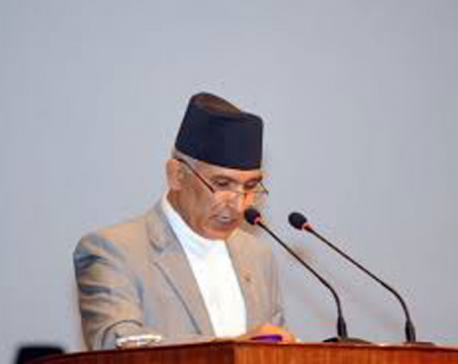
OR
BAFIA amendment bill still at Finance Committee
Published On: August 24, 2016 09:19 AM NPT By: Sagar Ghimire | @sagarghi
No discussion held in two months since parliament sent it back
KATHMANDU, Aug 23: The Finance Committee of the parliament, which was pressing the full house to immediately approve a bill to amend and unify the Bank and Financial Institution Act (BAFIA), has, however, been conspicuously delaying even the holding of discussions on the bill that was sent back by the parliament to the panel for revision of some of its provisions.
The parliament sent the amendment bill back to the Finance Committee on June 22 this year. But the parliamentary panel has not held a single meeting to discuss the bill in the two months since. Though the committee had put a discussion on the BAFIA amendment bill revision on its agenda for one of its meetings, the issue was not brought up due to time constraints.
The committee had endorsed the amendment bill on May 26 immediately after its sub-committee tabled its report at the committee which comprises seven legislators -- including Ichha Raj Tamang, who is the chairman of Civil Bank Ltd. However, the full house returned the bill to the committee, instructing it to conduct further discussions and review the provisions -- including those related to share allocation and lock-up, and the qualification and tenure of bank and financial institutions’ (BFIs’) management and directors -- that had drawn criticism.
The committee’s chairman Prakash Jwala attributes the delay in holding discussion to the change in the government.
“The process of taking the discussion ahead got stuck due to the change in government. We have to consult the new Minister for Finance about the amendment as the bill was introduced by previous governments, and the new administration might want changes in the provisions or have different positions. After all, the lawmaking process is all about coordination between the parliament and the government,” said Jwala says. “I have not been able to meet the Finance Minister to discuss the matter as he went to China immediately after he was sworn in,” he adds.
At the Ministry of Finance, the bill has been an issue less of a priority for the Deputy Prime Minister and Minister for Finance Krishna Bahadur Mahara, who was sworn in on August 4.
“The Finance Minister has not been able to discuss the amendment bill as he went for a China visit immediately after he was sworn in. There are other issues like the budget and other bills. The ministry will help expedite the amendment process once the Finance Minister is briefed on these issues,” Dhani Ram Sharma, a joint secretary who heads the Financial Sector Management Division at the MoF, says.
It is still uncertain when the committee will start discussions on the amendment bill revision. “I am now travelling out of the Kathmandu Valley. We will start discussions after I am back in Kathmandu and have consulted the Minister for Finance,” Finance Committee Chairman Jwala says. He says he expect to be back in the capital in a week but declined to give an exact date for the meeting to discuss the bill.
Experts say the delay in the amendment bill which has focused on strengthening corporate governance at BFIs may cause doubt amongst the international community like the International Monetary Fund and Financial Action Task Force on Money Laundering about the Nepal’s seriousness in implementing its commitment to financial sector reform and strengthening.
“REVISION NOT NECESSARILY NEEDED”
Meanwhile, Finance Committee Chairman Jwala told Republica that the full house committee’s decision to send back the amendment bill does not necessarily mean that the content of the bill should be altered.
“The full house has instructed us to discuss and reconsider some of the provisions, which does not mean that it must be revised. We will only revise the amendment bill if such action is deemed necessary deemed during the discussion and consultation,” he adds.
On June 22, the full house had asked the committee to review some of the contentious provisions in the bill including the definition of BFIs, promoter shareholders’ lock-up periods, allocation of shares to BFI employees and qualification and tenure of the board directors and chairs of BFIs.
The bill was sent to the finance committee following widespread criticism from experts, former Nepal Rastra Bank governors and economists on some of the provisions included in the bill as well as the involvement of bank chairmen and promoters in the formulation of the bill despite them having conflicts of interest.
You May Like This

BAFIA amendment bill back at Finance Committee for review
KATHMANDU, June 21: Following widespread criticisms of some of the provisions in a bill to amendment the Bank and Financial Institution... Read More...

Parliament sends BAFIA amendment Bill back to Finance Committee
KATHMANDU, June 21: Finance Minister Bishnu Paudel has withdrawn the Bill to Amend the Banks and Financial Institutions Act (BAFIA)... Read More...

Change of govt sends BAFIA amendment bill on the backburner
KATHMANDU, Aug 1: Change of the government has delayed discussion and deliberation on the bill to amend and integrate Bank... Read More...










Just In
- Heavy rainfall likely in Bagmati and Sudurpaschim provinces
- Bangladesh protest leaders taken from hospital by police
- Challenges Confronting the New Coalition
- NRB introduces cautiously flexible measures to address ongoing slowdown in various economic sectors
- Forced Covid-19 cremations: is it too late for redemption?
- NRB to provide collateral-free loans to foreign employment seekers
- NEB to publish Grade 12 results next week
- Body handover begins; Relatives remain dissatisfied with insurance, compensation amount







Leave A Comment